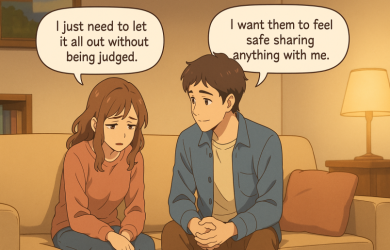3 Ways to Cultivate Intimacy in Your Marriage

Unlock Daily 30-Sec Tips for a Happier Relationship
👉 Subscribe FREEKey Takeaways
Marriage.com AI Quick Summary
“You must love in such a way that the person you love feels free” -Thich Nhat Hanh
I believe that we all long for deep intimacy. I also believe that we are afraid of the vulnerability it takes to cultivate such an experience in our relationships.
The unconscious drive to protect ourselves from vulnerability comes from fear of judgment, fear of rejection, fear of humiliation, and on the deepest level—fear of death. “If you don’t like me and deceive me, I might die,” or “If I let you in and you die, I will never survive that loss,” are two primal fears that can drive people’s unconscious motives, urges, and thoughts in social and relational interactions.
Because there are no guarantees that your partner won’t abandon you if you reveal your truth. People unknowingly keep themselves in a box to please their partner. This box is not only confined to your own growth and evolution, it is an attempt to control the very intimacy that you desire. When you withhold your truth, criticize your partner (even as a “joke”), give with expectation or condition, resist support, are inflexible in your views, try to be the person you think your partner wants, and/or are unresponsive to your partner’s hurt, needs, and desires, you are trying to control your relationship to protect yourself from vulnerability.
The other side of this level of control is projection. When you hold onto your ideas of your partner, the way you want a dynamic to play out, or the way you think your life together should be, you are trying to control your marriage rather than experience it. Your relationship is far more deep, changeable, and fluid then the rigid ideas we often hold about ourselves, others, and life itself.
We’re told that the bond of marriage should be unbreakable, that the 50% who divorce have failed and that those who stay together are a success. We are told that as a couple we will create deep intimacy that stands the test of time and we’ll be wholly satisfied in our relationship with the person we choose as our partner in life. And then we come together, two flawed humans, most of us with attachment wounds from childhood (coincidentally, 47% of us have attachment wounds, which is almost the same as the divorce rate), wanting to create something that we are too scared to really open up to.
In an attempt to feel secure, we cling to one person as our person, and we try to control that person and the dynamic in the relationship. Because of the inherent impermanence of human relationships, the groundlessness that we feel is compensated by trying to find some ground, trying to find some permanence.
This is why I call marriage a hoax: Because the story we are sold about marriage tells us that we get our security from our partner, that we’ll create a life together that will endure hardships, and that if we stay together we are successful. The story doesn’t include the evolution of our own consciousness, the healing of our own wounds, or the impermanence of life and relationship.
When two people come together in marriage more committed to keeping their person for the rest of their life then they are open to growth and evolution, but love can easily suffocate. Switching the old script from “Till death do us part” to “We’ll see what happens as we grow and evolve together,” is an edge that many are too afraid to embrace. However, I ask you to consider the possibility that when you step outside of your box and stop trying to put your partner in a box then you might actually experience the depth of intimate connection that you have been wanting for your entire life.
Any time we lean too heavily on another person for our stability, we are guaranteed to have our world rocked sooner or later. Looking to someone else for security has the inherent belief that you are fragmented or unwhole in and of yourself. If you collapse around your sovereignty and wholeness, trying to control yourself, your partner, and your dynamic, eventually you lose sight of your own growth, evolution, and health and you stop seeing your partner beyond your projections and your needs.
What would it be like to meet one another from your wholeness, to be so aligned with your sovereign self that you own your truth is in integrity with yourself? What would it be like to offer your truth with ownership and care, not trying to manage how it lands in the other? How might it feel to stand your sacred ground, without collapsing or puffing up, and stay open in your vulnerability?
This level of intimacy in your marriage takes courage, safety, and tremendous self-awareness. Here are three skills you need to cultivate for this depth of connection in your relations:
1. Communicate for connection rather than for control:
Holding the intention of having your words be connecting rather than damaging is the first step in creating emotional intimacy. Your words are very powerful: They can tear each other down or light each other up. They can keep a wall between you or keep you open and connected. They can be threatening or cultivate a culture of safety.
Even if you want something practical, asking in such a way that has you feeling more connected and less like you’re making a demand or giving orders can subtly shift your relational dynamic over time. I often say to the couples I work with “When you’re fighting about the dishes, it’s not about the dishes.” This is to say that if you are upset with your partner for not contributing more, taking initiative around the house, or are defensive about how much you offer the household, you are trying to control how the other person behaves.
If you are attached to the outcome of communication, meaning that you’re communicating something to get your partner to see your point of view or to do the thing you want, then you are trying to control your partner. To state the obvious, no one likes to be told what to do and a tit-for-tat tally of who has done what, this is not going to make you feel more connected.
For more charged topics, like an argument that is chronic or that you’ve been collecting resentment and evidence against your partner for a long time, you may likely be identified with your story and believe that you hold the truth of what happened or what was going on with your partner. If you communicate from this place, you are seeing the situation from from a limited perspective and will inevitably get you away from connection and solution. Loosen your grip on your story and remember that both of you contribute to create a relational dynamic. Come back to your intention for connection, remembering that you both want to feel closer after the communication. Allow your words to cultivate the intimacy you desire. Perhaps this is the most vulnerable act of all.
2. Reveal what’s going on for you:
When you’re communicating for connection, the most connecting thing you can do is share with your partner about what’s going on with you. The skill of revealing your experience is one that needs to be practiced and cultivated over time. While it’s easier for some than others, we do not typically speak in a language that reveals our inner world to those around us.
For example, if my partner asks me why I work so much, I can easily get defensive and hold a story of judgment and shame without a deeper reveal. If instead my partner says, “I feel lonely and I have some sadness about how little I get to see you. Lately, you seem to be working more, and I’m wondering if you are avoiding me,” I get a deeper look into my partner’s world and what is underlying the story that I work too much. If the first way (without the reveal) is stated and I hold it as I’m doing something wrong, we feel less connected, which is not the actual thing my partner wants. If the second way (with the reveal) is offered, I know that my partner wants more time with me and also wants some of my attention.
Emotional intelligence and emotional intimacy are the foundation for all successful relationships. When you allow your partner to see into your inner world with your language, you’re being vulnerable in such a way that honors the depth of your connection with your spouse.
Reveal language typically feels oriented, followed by an explanation. The explanation is always stated in a language that has ownership over your own experience. For example, do not say “I’m frustrated with you because you never snuggle with me at night” or “You make me angry every time you stare at your phone in bed instead of snuggling me.” Inherent in these two sentences is a sentiment that if the other person behaved in a certain way, you would be okay. There is no ownership in that.
Instead, say, “I feel frustrated because I want more physical touch before bed, and I feel that you’re more interested in your phone than being with me.” The language here own your frustration as yours, and it also holds your story as your own. This gives voice to your subjective reality while letting your partner in on your inner world.
3. Be curious:
When people get triggered, they can easily go into a pattern of being defended. When your partner comes to you with feedback about how he/she feels hurt by something you said or did, you may try to explain, tell them how they’re wrong, or bring out a long list of the way they have hurt you. This pattern keeps us from vulnerability and intimacy.
When you defend yourself to your partner, you stop being curious about what they’re experiencing and you create a barrier in your connection. As challenging as it may seem, try to stay open to connection and be in your vulnerability through your curiosity.
“It sounds like you are really angry with me for telling your mom that you’d come do yard work for her. Tell me more…”
Reflect what you’ve heard, paraphrase, and ask if anything else can go such a long way in nurturing connection in the midst of an argument. This takes a high level of awareness, dedication to the connection, and regulation to be in this type of dialogue with one another. As you evolve and grow together, this type of communication replaces rigidity and stubbornness with fluidity and flexibility.
 Tips
Tips
Write your tip or submit a video tip
All tips are reviewed before the publishing.
Share this article on
Want to have a happier, healthier marriage?
If you feel disconnected or frustrated about the state of your marriage but want to avoid separation and/or divorce, the marriage.com course meant for married couples is an excellent resource to help you overcome the most challenging aspects of being married.
Related Articles
Recent Articles
Related Quizzes
Unlock Daily 30-Sec Tips for a Happier, Healthier Relationship
👉 Subscribe FREE on YouTube We'd love your feedback!
We'd love your feedback!
 Expert Q&A
Expert Q&A
Ask your question related to this topic & get the support you deserve from experts.



















 Thanks for your feedback!
Thanks for your feedback!